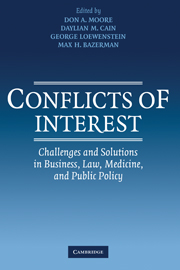Book contents
- Frontmatter
- Contents
- List of Contributors
- Acknowledgments
- Introduction
- PART ONE BUSINESS
- PART TWO MEDICINE
- PART THREE LAW
- 13 Legal Responses to Conflicts of Interest
- 14 Commentary: Conflicts of Interest Begin Where Principal–Agent Problems End
- 15 Conflicts of Interest and Strategic Ignorance of Harm
- 16 Commentary: Strategic Ignorance of Harm
- PART FOUR PUBLIC POLICY
- Index
14 - Commentary: Conflicts of Interest Begin Where Principal–Agent Problems End
Published online by Cambridge University Press: 04 August 2010
- Frontmatter
- Contents
- List of Contributors
- Acknowledgments
- Introduction
- PART ONE BUSINESS
- PART TWO MEDICINE
- PART THREE LAW
- 13 Legal Responses to Conflicts of Interest
- 14 Commentary: Conflicts of Interest Begin Where Principal–Agent Problems End
- 15 Conflicts of Interest and Strategic Ignorance of Harm
- 16 Commentary: Strategic Ignorance of Harm
- PART FOUR PUBLIC POLICY
- Index
Summary
Sam Issacharoff argues that conflicts of interest can be dealt with as a classic case of a principal–agent problem in which the agent's interests differ from those of the principal. After articulating this general perspective and illustrating it with the case of law, Issacharoff then proposes a tripartite classification of legal responses to conflicts of interest, each of which, he argues, has the goal of bringing the agent's behavior more closely in line with the interests of the principal. The main thrust of this commentary is a question of whether, in fact, conflicts of interest are well dealt with as a principal–agent problem.
The conflicts of interest that were the focus of this conference all take a common form: a clash between individuals' self-interest, on the one hand, and their professional duties, on the other. Principal–agent formulations, I would argue, are well-suited to modeling the self-interest side of this equation, but they have almost nothing to say about the other side of the equation: professionalism.
When professionals are confronted with charges of bias resulting from conflicts of interest, inevitably their first reaction is that they are not vulnerable to bias as a result of their professional training. Thus, for example, Don Moore, in his commentary on Mark Nelson's paper, cites Gary Shamis, Chairman of the Management of an Accounting Practice Committee at the American Institute of Certified Public Accountants, to the effect that, “We are professionals that follow our code of ethics and practice by the highest moral standards.
- Type
- Chapter
- Information
- Conflicts of InterestChallenges and Solutions in Business, Law, Medicine, and Public Policy, pp. 202 - 205Publisher: Cambridge University PressPrint publication year: 2005
- 2
- Cited by



